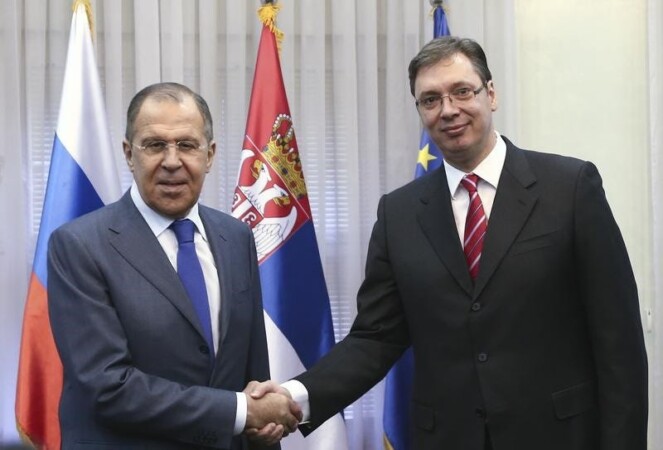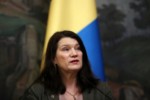Russia and Serbia are gearing up for an official visit exchange over a week-long period. Russian Foreign Minister Sergey Lavrov will visit Serbiaon June 18, and just six days later, Serbian President Aleksandar Vučić will visit Moscow to attend the postponed Victory Parademarking the Soviet victory in World War II. In between those two visits, Serbia’s parliamentary elections will take place on June 21. That is no coincidence: Russia plays a major part in Serbian politics.
The importance of domestic politics in the Serbo-Russian partnership is overlooked by many in the West. Serbian politicians have to keep Russia onside in order to stay competitive on the political market. This is the powerful effect that the Kosovo issue still has on Serbian politics and on Russia’s popularity in Serbian public opinion.
Kosovo remains one of the most emotive issuesin Serbia. Every new Serbian government has had to conduct a rigorous anti-secessionist policy to try to save face on the issue and appease Serbian voters. This leaves Serbia locked into its partnership with Russia, whose veto in the UN Security Council prevents broader recognition of Kosovo’s independence. As long as the Kosovo dispute remains a make-or-break factor in Serbian politics, every Serbian government will need an open door in Moscow.
Both Donald Trump’s envoy for Serbia-Kosovo dialogue, Richard Grenell, and the recently appointed EU Special Representative for the Belgrade-Pristina Dialogue, Miroslav Lajčák, expect resolution of the Kosovo-Serbia dispute. This will not be easy for Belgrade, and it will be difficult for Vučić and the Serbian government to sell it to their people, as Vučić acknowledged in a recent statement.
“We have ahead of us six months of a tough political struggle for our national interests in Kosovo and Metohija [the Serbian name for what is now the state of Kosovo] and for the rights of our people there.… For us there is no happy solution there, whatever it may be. We cannot be particularly satisfied. I cannot lie to the people,” the president has said.
Vučić will therefore play the Russian card to extract a less politically painful deal on Kosovo. The Serbian president needs to show his public that whatever the solution he negotiates, it has Russian backing, making it more acceptable to Serbian voters. If Putin were to obstruct any negotiated settlement, Vučić would be in trouble, as Serbian nationals would see that as Moscow being firmer in its defense of Kosovo than the Serbian leadership itself.
This dynamic is the result of the growing popularity that Russia and Putin enjoy in Serbia, where Putin remains the most popular foreign leader. The majority of Serbs falsely believe that Russia is the biggest donor to Serbia, instead of the EU. However, while Russia’s popularity in Serbia is the product of the memory of the Western interventions in the 1990s and a reaction to Kosovo’s independence, in public opinion polls Serbs show a strong inclination toward the West on issues of economic welfare, education, and healthcare.
Given these conflicting sentiments, Serbian political parties use Russia to win the votes of both pro-Russian and pro-European Serbs. The emotional displays toward Russian dignitaries visiting Belgrade are frequently aimed more at the Serbian public than at the Russian guests themselves. In 2014, as the West panicked over Russia’s role in the Ukraine conflict, Putin was a guest of honor at a military parade marking the seventieth anniversary of Belgrade’s liberation from Nazi occupation. In January 2019, 120,000 Serbs rallied in front of Belgrade’s church of Saint Sava to welcome Putin.
For Vučić and his Serbian Progressive Party (SNS), Russian support is a strong advantage at home. This is evident from interstate visits that correspond with Serbian electoral cycles. Vučić visited Putin in Moscow a few days before the April 2017 presidential election that he won. Back in March 2014, Vučić also went to Moscow in between the Serbian parliamentary elections and becoming prime minister of the new Serbian government. Following the Serbian parliamentary elections in May 2016, he visited Moscow once again.
Now Vučić wants to use a new round of state visits to capitalize on the popularity that Putin and Russia have among SNS voters by showing that he has Russia’s support. This support will be a valuable asset, as the elections will be held in an atmosphere of high political tension, and not just because of Kosovo. Serbia combated the new coronavirus pandemic with draconian measures including a state of emergency and curfews, and the Serbian economy is suffering badly. Anxieties are high.
The list of Serbian political woes does not end there. The timing of the elections so close to the end of the state of emergency gives the ruling SNS an advantage over the opposition. The dominance of Vučić and his party has prompted Freedom House to qualify Serbia as a hybrid regime instead of a democracy in its most recent report, a verdict that was denounced by the Serbian government. Meanwhile, the majority of Serbian opposition parties will boycott the elections, demanding fairer electoral conditions and adding to the atmosphere of intense polarization between the government and the opposition. The opposition bloc is bitterly divided between those parties boycotting elections and those participating in them, adding fuel to the fire.
Vučić’s current dominance is so pronounced that he is expected to win regardless of the electoral conditions. Still, amid the political turmoil surrounding these elections, and despite the fact that Russian influence in the Balkans has been shown to be limited, the lingering issue of Kosovo and the fact that Russia sells well among Serbian voters will prompt Vučić to draw on Russia’s support once again.
———
by Vuk Vuksanovic
———
The original Article can be found @CARNEGIE






Leave a Reply